En la escuela me ensenaron que en el Apartheid
no todos son iguales y no importa la ley,
por eso me molesto con las cosas que veo,
eschame brother: “fuck you bloqueo!
“pero entindelo man
tamalo como quieras,
la politica no cabe en la azucarera.
In school they teach me that in Apartheid
Not everyone is equal and the law doesn’t care,
Because of this the things I see bother me,
Listen to me brother: Fuck you embargo!
But I understand man!
Take it as you will,
Politics doesn’t fit in a sugar bowl.
-Cuban Singer/Songwriter Carlos Varela, “La politica no cabe en la azucarera”
I climbed out of the 1957 Chevy and crossed Calle San Lazaro before ringing the doorbell at #408. I looked up to see Ray waving down at me with a cigar in his mouth from the balcony above. This felt like something out of A Chorus Line, sans the drama and angst of competition- that was reserved for the Alicia Alonso-trained ballerinas, sinewy, svelte and sweaty as they emerged from a rehearsal of The Magic Flute at Gran Teatro Garcia Lorca. Even though this was pure fun, I couldn’t help but think of Sheila’s voice singing “up a very steep and narrow stairway to a voice like a metronome as I ascended to the top floor. This building located in the rundown neighborhood of Centro Habana seemed to vibrate from the pulsating beat of salsa blasting from Ray’s apartment. Standing ready to greet me at the door, Ray sported a SPAIN jersey, long jean shorts and Adidas sandals. I passed the statue of San Lazaro, a central figure of healing in the Santer’a faith, which was illuminated and enshrined in a glass class beside the door. He put on Adalberto Alvarez, and I was ready for my two hours of “training.”
The goal: to move like a Cuban. Dancing the rhythms of son, Ray patiently corrected me. “Carolina,” he would say, “you can’t dance like a soldier-loosen up. “so es, suave, suave, suave- There you go, smooth, smooth, smooth.” He switched to chachach”, and I smelt wafts of humid air entering from the open windows as it mixed with the kitchen’s aromas of chicken, hot oil and garlic. The street sounds from below drifted inside, and I danced casino with Ray’s son, Joan (pronounced YO-AHN). Beams of late afternoon sun formed our moving silhouettes on the wall. “Think of your hips as a swinging pendulum,” Ray explained. “Always in motion, and always swaying from side to side.” Picturing my hips as such, I strove to release this region of my body often kept rigid in the colder North American climate.
We took a break, and Ray gave me a glass of water. I walked to the balcony providing a rooftop view of the Caribbean to the north and dilapidated structures to the south. They were falling apart before the workers could attempt to Band-Aid the buildings with the few construction materials they had. I spotted a painted mural showing the faces of Che Guevarra, Fidel Castro, and Camilo Cienfuegos next to the painted words “Rebelde Juventud: Estudio, Trabajo, Lealtad-Rebellious Youth: Study, Work, Loyalty.”
I thought about what Meiling’s boyfriend had said. :Utopia? No. In a utopia you don’t need money to survive. We do, but there’s not enough of it,” he said. “I meet tourists like yourself who always say they love Cuba and want to live here. But visiting and living in Cuba are two different things,” he tells me. “We can’t enjoy Cuba the same way you do because we don’t have the extra money to travel the island or even go to a concert right here in Habana.” He concludes by saying that Castro’s revolution was necessary, but that another “revolution within the revolution” is needed”.
Continuing to sweat salt and last night’s rum, I dance rumba before paying Ray for the week’s lessons. $5/hour is unheard of back home. It’s a bang for my buck considering I’m learning how to salsa in its own birthplace. Leaving the apartment, I pass the towering Hospital Almejeiras on my way to catch the P-5 bus. Doctors wearing white lab coats emerge from the entrance, and I contemplate socialized medicine. A trombone player we met last night told us about the heart problems he suffered as an infant. Revealing the pacemaker in his chest, he proudly proclaimed, “It was free!” One of the Revolution’s biggest aims, universal health care, was intended for the betterment of all. However, because of the serious shortage of drugs (due in part to the embargo) not all patients are treated effectively. Three weeks later in Santiago I would meet Abraham, a 23 year-old suffering from chronic ulcers. He would kindly ask me to send medicine from the States.
While boarding the P-5 bus, the older gentleman in olive green fatigues kindly pays my 1-cent fare. Sunburned skin is the dead giveaway I’m not from around here, and my minority status garners stares from the passengers. They wonder what brought this yuma to their island. The bus coasts the Malecon, and I absorb the scene along this soaked, three-mile concrete seawall. Legs dangling over the edge, schoolchildren scream when the inertia of another crashing wave sprays their uniforms. Nearby, a young man kisses the forehead of the woman resting in his lap. I imagine what the view must have looked like 300 years ago when pirates threatened Spanish vessels carrying silver fresh from Pere. Slave ships from the east would have docked and unloaded the precious “cargo” soon to be broken by the sugar cane harvest awaiting them in Matanzas.
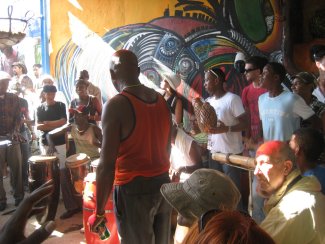 Fast-forward to 1962, during what Cubans refer to as the “October crisis.” It’s a different story now, and U.S. navy vessels quarantining the harbor have replaced the old European trading crafts. “For most of its history, Cuba has been a colony continually exploited and dominated by others. All it wants now is some autonomy- and on it’s own terms,” one professor had told me. Remembering sections of the Helms-Burton Act, I sensed the nation’s frustration over the failure of the U.S. to understand its Cuban neighbor. Appendix C in author Richard Gott’s Cuba: A New History (Yale, $17) includes a few of the act’s excerpts sure to make Jose Marta roll in his grave:
Fast-forward to 1962, during what Cubans refer to as the “October crisis.” It’s a different story now, and U.S. navy vessels quarantining the harbor have replaced the old European trading crafts. “For most of its history, Cuba has been a colony continually exploited and dominated by others. All it wants now is some autonomy- and on it’s own terms,” one professor had told me. Remembering sections of the Helms-Burton Act, I sensed the nation’s frustration over the failure of the U.S. to understand its Cuban neighbor. Appendix C in author Richard Gott’s Cuba: A New History (Yale, $17) includes a few of the act’s excerpts sure to make Jose Marta roll in his grave:
A democratically elected government in Cuba – is a government which is substantially moving toward a market-oriented economic system based on the right to own and enjoy property – is committed to making constitutional changes that would ensure regular free and fair elections – [and] has made demonstrable progress in returning to United States citizens – property taken by the Cuban Government on or after January 1, 1959″ (331).
A perturbed Fidel would agree with Gott’s conclusion that the act arbitrarily “reasserted the US right to define the nature of Cuba’s democracy” (304). While the act laid out the ideas of what did and did not constitute a free society, the legislation made no difference on Cuban policy. Gott writes that the majority of Cubans were not “ready to abandon the Revolution at the behest of the United States, or to give up the first genuine attempt in their history to establish an independent republica (306). In other words, Cuba said BOOYA! in its refusal to endorse the act. (The first definition of the word “booya!” provided by www.urbandictionary.com is “Bam!”, “in your face”, and “hell yeah”, all at the same time. A term that self-congratulates, describes excitement, lets others know the magnificence of the celebration as well as the superiority of the user, and is used as an exclamation of those ideas. Say “booya!” when you play a trick on someone or beat them at a game, or prove your superiority to others.”)
Getting off the bus at Calle 23, I catch the 6 pm showing of Dr. Zhivago at Cine Charlie Chaplain located between 10th and 12th streets. The dark, air conditioned theater is an instant relief from the heat. For the next few hours, the theater is a microscope into the forbidden, outside world, and moviegoers “escape” the island, transporting themselves to the icy Russian tundra. I understand why the cinema is such a popular Cuban pastime. Watching Omar Sharif and the lovely Lara resist the bourgeoisie to the backdrop of the familiar balalaika-based soundtrack, the complications and parallels between the 1917 and 1959 revolutions resonate with the audience.
Gromyko: [reading newspaper] They’ve shot the Czar. And all his family. What’s it for?
Zhivago: It’s to show there’s no going back.

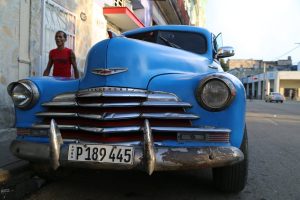
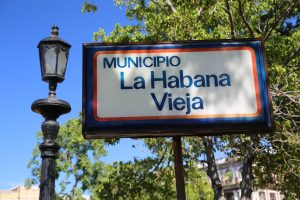
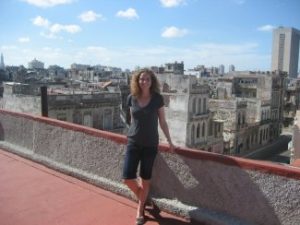
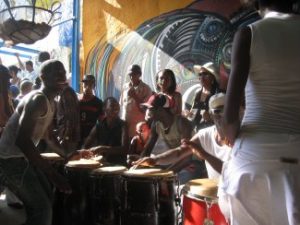
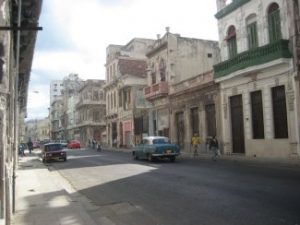
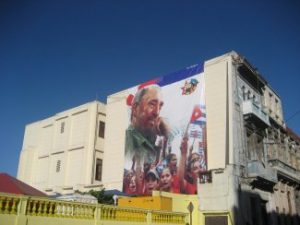
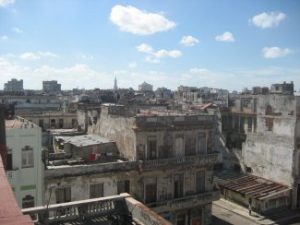
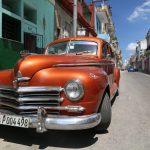
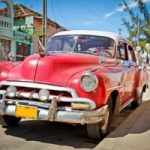




Leave a Reply